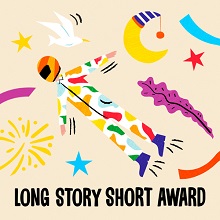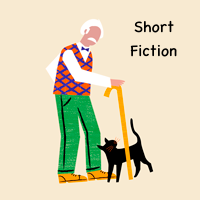And still I'm traipsing through the fields
of wildflowers and grass and foxtails. Beyond
these
...
[+]
That particular morning was damp, and it arrived slowly and regularly, like waking up on a Sunday. Quickly, the morning became a gloriously sunny day. She started that morning in the valley, heading upwards, and as she walked, the blackbirds in the trees above nattered away like gossipy old women. She tuned them out, watching her feet instead.
The ground rose up under her street shoes, and within a few hours she was a quarter of the way up the mountain. The water glittered far below her. As the day went on, the trees turned white and slim, and the wildlife quieted to a low hum. Her knapsack pulled at her shoulders, but she knew that she was carrying as little as she could. In the main compartment: a water bottle, some clothes, a bit of soap, and a blanket. The various pockets stored a knife borrowed from her brother, a half-empty matchbook, what remained of her money, and a leatherbound notebook and pencil. She had a bit of food too, but she was running low. She would need to find another town soon.
At the thought of food, her stomach grumbled. It had been hours since the leftover fish she’d eaten that morning. Finding a nearby birch, she sat down against it, shrugging her knapsack off her shoulders and rummaging around inside until she pulled out some salty crackers. She could afford to eat about half of them, most likely. She popped one in her mouth, chewing thoughtfully. After a moment, she dug around some more for her notebook. Pulling it out, she wrote:
18th of August, 1922
Sweden, Day 19 of Seeing the World
My Dearest Beth,
I understand now why you wanted to come here so badly. It’s nice here. Calming. I have been wondering if this trip was the best idea. I know Mother was against it. She wanted me to bring a guide, at least. I almost wish I had. I’m doing fine on my own—you know I’m never one to go anywhere unprepared—but it does get lonely. I miss your smile. You know you get the most adorable little crinkle next to your right eye when you smile? That would make this place feel so much brighter.
I saw a herd of moose in the valley yesterday, drinking from the river, and every single one was white. They made me think of that lovely dress you wore to the Olympics. That was a good day, wasn’t it? I wish nothing more than to be back there again.
The birches are amazing here, you know. They aren’t bendy, like the ones in England, but they stand straight up. Everything looks the same, yet shifts with every step. I can only imagine the poetry you would write about this place, my love. You would describe it much better than I can.
I believe I will reach the summit in two days. I picked up a lovely little stone by the river two days ago. I will leave it there for you, as promised.
Missing you always.
♡ Marie
She sighed, letting her head thunk back against the tree and looking up to the canopy above. Late afternoon sunlight danced through the leaves, creating strange patterns. She breathed slowly, closing her eyes. She breathed in the smell of wet earth and tried to think of nothing.
When she leveled her head again, she was making direct eye contact with a cow, just a few metres away. She froze. It blinked lazily at her, huffed, and walked closer, the bell around its neck jingling quietly with each step until it stopped directly in front of her. She didn’t dare to breathe. It leaned its head down, picked up her knapsack delicately in its teeth, and righted itself again.
“That’s mine,” Marie whispered. The cow huffed again. Its eyes were brown and soft, and surprisingly intelligent. They watched each other.
Suddenly a strange, high-pitched sound floated in on the breeze, and the cow turned immediately. So did Marie. It was a haunting, whimsical call—sad, but beautiful, and her breath caught in her throat. It was like singing, but unlike any song she had ever heard. Chills ran down her arms. It was faint, but distinct, and the cow seemed to recognize it. It began to trot away, towards it, her bag still in its mouth.
“Hey, wait!” Marie ran after the cow, journal still in one hand and skirt hitched up in the other as she navigated the undergrowth much more clumsily than the beast ahead of her. “Wait! That’s mine!”
The cow plowed ahead, and Marie scrambled behind it until they broke out of the trees onto a wide, hilly field. The sound was significantly louder now, and more cows were appearing from the forest around them, bells clanking, all heading towards it. Marie slowed to a stop at the top of the first hill, hands on her knees, trying to catch her breath. The sun was setting now, and the bright orange light arched over the field, illuminating the source of the call: at the bottom of the hill stood a woman in a white dress.
Marie’s heart stopped. Beth? But no, this woman was here, and blonde, and Marie watched in awe as the cows came to her like moths to a flame. They settled before the woman, and she stopped singing. She shaded her eyes to look in Marie’s direction, and waved. Marie waved back. The woman beckoned, and forward Marie went, trotting down the hill herself now to where the woman stood. As she got closer, she saw the woman was smiling.
“Vem är du?” The woman asked.
“Sorry?”
“Vem...är du?” She said, more slowly this time.
“I’m sorry, I don’t know much Swedish, I don’t understand,” Marie fumbled. “Ah, det förstår jag inte. Jag talar ingen svenska.”
“Ah, you are English,” the woman smiled. “I said, who are you?”
“Oh! My name is Marie. Sorry, who are you?”
“I am Eva.” She spoke slowly, enunciating carefully.
“Well, it is nice to meet you,” said Marie. “Your cow, ah, it has my bag.”
“Ah, so she does!” Eva laughed. She walked around to the particular cow and gave it a look, hand outstretched. The cow dropped her bag neatly into Eva’s hand, and she handed it back to Marie. “I am very sorry. The cows, they are trouble sometimes.” Eva was quite beautiful, Marie thought. Her face was kind, and perhaps it was something about the golden light or the white dress or her own loneliness, but Marie thought she looked almost like an angel.
“That’s alright,” she smiled. “What were you just singing? It sounded sad.”
“Ah! That is kulning. It is to call the cows home. I learned it from my mother, and my mother learned it from her mother.”
“Oh. It is beautiful.”
Eva smiled. “Thank you. Today, it calls both the cows and you home. This has never happened before. Are you...” Eva seemed to search for the right word. “Lost?”
“No, I just–” She hesitated. “Well, yes. Yes, I suppose I am.”
“Come,” she said, and started to walk away, hips swaying and the cows following in her wake. “Come, and I will help you find your home.”
With a smile, she went.



